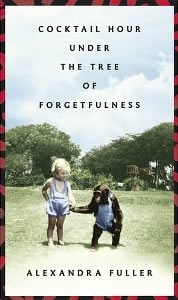Book Notes
 Alexandra Fuller, Cocktail Hour Under the Tree of Forgetfulness (New York: Penguin Press, 2011), 238pp.
Alexandra Fuller, Cocktail Hour Under the Tree of Forgetfulness (New York: Penguin Press, 2011), 238pp.
In this her third family memoir, Alexandra Fuller (b. 1969) honors her "matchless and wonderful parents" and the family life she experienced growing up in a bygone era of Rhodesia (which became Zimbabwe in 1979), Malawi, and Zambia. Fuller was born in England but moved to southern Africa with her parents when she was two, living there for the next twenty years. In 1994 she moved to Wyoming with her American husband, where she lives today.
Fuller's debut memoir about growing up in Africa, Don't Let's Go to the Dogs Tonight (2001), won several awards, including a New York Times Notable Book. Her second book, Scribbling the Cat (2004), describes the atrocities of war through her strange friendship with a battle-scarred veteran of Rhodesia's wars. Cocktail Hour focuses mainly on her eccentric mother, Nicola Fuller, a woman of deep Scottish roots who lived most all her life in Africa, and who was plagued by alcohol and madness, not to mention the turbulence of that time and place. Her father Tim was the silent type; his mother was a "catastrophic drunk." He, too, loved the bottle and his pipe, perhaps his two sources of solace as he bounced from job to job and country to country across the decades.
Most of all, Tim and Nicola loved each other and their family, despite the forces of history that shook the African continent during those years, and despite numerous family tragedies that included the deaths of two of their children. It was not an easy life, not by a long shot. Fuller writes about her family with a combination of humor, brutal candor, and genuine compassion. Her mother especially faced her manic highs, deep lows, and periods of hospitalization with courage and a British stiff upper lip that served her well. No use to complain. Much of the book appears to have been written a few years ago when Fuller returned to her parents' home in Africa in order to unearth the family archaeology and catalog the story-telling. The story is very much one about attachment to a land, which land she describes as "Mum's love affair and Dad's religion." Despite the wars, the heart aches, mental illness, and disappointments, it's still no surprise that her parents want to be buried in Zambia.


